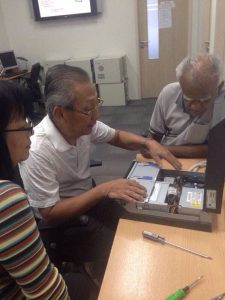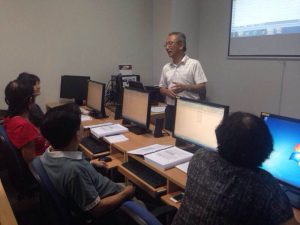His love affair with computers
Thanks to working with computers in his early days, Sunny Chan has faced the computer and tamed it, and is using his skills to help seniors at RSVP.
BY: Eleanor Yap
Sunny Chan has an interesting way of sharing his age. “I am 18 plus 50 years of experiences, that is 68 years,” said the father of two, who has yet to take on the title of grandfather. Unlike most seniors, he is not afraid of computers and relishes them, thanks to having faced them early on and now, using his skills to helping seniors at the non-profit organisation, RSVP Singapore – The Organisation of Senior Volunteers.
Ageless Online finds out how his love affair with the computer got started:
How did you first get connected to computers?
I was with the Royal Air Force (RAF) doing servicing and maintenance during the confrontation days around 1965 as a wireless fitter for its Doppler radar system in its aircrafts. I learnt about hybrid computers, which are digital and analog integrated to detect location and provide guidance to aircrafts – meaning jets and Navy ships.
From there, I went to Texas Instruments (TI) as its electronics technician. I had studied basic electronics on its valve computers to integrated circuits like Large Scale Integration (LSI) and Very Large Scale Integration (VLSI) to On-Line Dataprep on UNIVAC computers. Later, I went to Zurich to learn and commission a Chartered On-Line UNIVAC 1100 series computer in Hong Kong and then in Singapore, the DBS Chartered On-Line similar series which is a large-scale computer. In those days, that took up more than one floor in the DBS building.
This is where I decided to design the first dataset for data communications in my bed out of my HDB flat at Bendemeer. I sold these datasets to the Singapore Department of Civil Aviation and DBS in the mid ’70s and made S$30,000!
After UNIVAC, I went to work for ICL. I went to Sydney, Australia to learn about its 2900 series besides the old 1900, as well as micro-coding programing. Later, I joined HP Singapore as its customer engineering manager and then as its support manager for both hardware and software engineering support services. I used to have my own financial forecasting package where I would carry out regional yearly forecasting for the Far East Region Support Services. To do this, I did not need to stay in Hong Kong to do forecasting reviews. In fact, I could travel and make the necessary changes online rather than do it manually at the regional headquarters in Hong Kong.
While in this regional position, I started the first remote diagnostic, which later HP further developed and made it to a Response Centre and what others called a Call Centre. This is exactly what we have today at RSVP (with support from IDA and C3A) where we provide seniors IT support through the Helpdesk services and IT clinics.
I am a senior member of US-based IEEE (Institute of Electrical and Electronics Engineers) and was a member of UK-based IEE (Institution of Electrical Engineers). Through these organisations, I keep abreast on computers and the latest in electronic developments.
Looking back, I am surprised I went through valve computers through transistor computers, to IC (integrated circuit), LSI, VLSI and so forth, and many input devices from teletyping machines to paper tapes, Mylar tapes, card readers, tape drives, drums storage to now flash memories and solid state memory. Wow!
I understand you wrote your own diagnostic tools to troubleshoot computers and network terminals. What’s next for you now that you have achieved that?
This was done in each stage of my career when the job called for it. For instance, when you have to troubleshoot the Printed Circuit Board (PCB) to component level, without a low-level language diagnostic, you cannot just locate and pinpoint to the tiny component that causes the problem. It saves time and effort if you can locate and change out the component. This would be the most effective and cost-efficient solution rather than replacing the PCB as it is more expensive and probably takes time to find a replacement from overseas as not all PCBs are stored locally.
I did that in TI in the late ’60s and early ’70s in Dataprep and UNIVAC where transistor computers were used. In HP Singapore and the Far East region period between 1978 through 1983, I did many repairs using self-written diagnostics including fixing design problems in the HP 3000 general-purpose computers for the oil-rig companies and large corporations like Exxon and NUS.
I am now able to transfer these skills to others today where their approaches to troubleshooting can use the NASA tree approach to locate a problem. It needs a comprehensive understanding of the processes and the fundamental design of computers. I hope to facilitate and teach seniors in contact with me to have this knowledge so they can help others to keep their computers running at optimal levels.
Can you share your work with RSVP and how long you have had a relationship with them?
I have been with RSVP for about two-and-a-half years. I was originally with the Senior Volunteer Training Centre (SVTC) to kick-start the programmes to develop senior volunteers so they can find a purposeful life. About a year after that, I took over the organisation’s Cyberguide training to relieve the current president of his many duties.
Then by default, I was drafted into doing Silver IT Care (SITC), which provides Helpdesk and IT clinics to seniors who want to keep their computers running at optimal levels and be connected to the world. The initiative was started in October 2012 when first C3A gave us the funding but IDA has since gotten involved to develop further a database program that will enlighten the speed and load of the Helpdesk and IT clinics. This database comprises of diverse fault reports with recommended solutions for different brand of laptops, computers and smartphones. It can assist the seniors who are troubleshooting to identify problems speedily instead of doing Google searches or asking fellow seniors.
How has infocomm technology (IT) helped you personally?
IT has been a tool for me to get around and stay connected with the world. I have a digital library to read the latest electronic developments while my friends around the world keep me posted of changes in technology, product developments and processes. I remembered when I was doing my MBA and theological studies at Gordon-Conwell Theological Seminary in the US from 2004 to 2006, I used IT tools to facilitate many interactive debates and paper writing.
In fact while I was a Board of Governor member at Singapore Polytechnic (SP) and as the deputy chairman, I introduced the Virtual College from New York State University to potential SP students to do their pre-requisites before coming to the campus in 1995. IT is a great tool if you know how to harness its usefulness.
My personal life is enriched with IT and I share my joy with others as well. I use IT abundantly in researching my sermons and sharing the gospel. I am currently serving as an Elder of the Bukit Batok Presbyterian Church.
What are some myths seniors have about IT? Why do you think some seniors are afraid of IT?
In general, people are afraid of IT as it carries information to the unknown and sometimes hits back at the sender probably for being stubborn and not obeying the command, or missing a character or typo error. It may look like it is unforgiving for simple mistakes, while trying to protect the innocent user who may not have spotted the error.
Seniors in general like everybody else want to take control of the IT they use. But because it is maybe their first time they are using it, they face many unfamiliar avenues. When these unfamiliar avenues appear, they are often shocked and lost like Alice in Wonderland – and they do not know what to do.
Today, computer applications are written in a more friendlier way and they allow the user to continue their mistakes and in most cases, suggest the correct spelling and ask is that what you want? Or mean? Fear blocks our brain from thinking except to take cover or find an escape route. Just plough through it and the solution becomes quite obvious.
For problems that appear in computers, it is not just operating errors. It can be the computer itself having its own functioning error. This is more complicated as one has to be familiar with error codes. You can just go to another working computer and search through websites to find a solution. From there, you probably know how to fix it yourself. There are many solutions and search engines that can help; some are even in the Cloud (over the Internet instead of on your hard drive). There are even videos to guide you.
What advice would you give to seniors who might be hesitant in using computers? How can they overcome their fears?
First we must not get into a panic mode as this destroys our innovative thinking. Take the issue or problem face-on and search another working computer or in most cases read the manual of your desktop, laptop or tablet. Most boot-up problems are caused by a bad profile, corrupted boot file or lost links. Sometimes doing self-repairs with the right function key during boot-up will correct many of these problems. Others if they have a recovery disk or system disk, they can carry out self-repairs and the system will boot up.
However, in more than 90 percent of the cases, many computers like yours or mine suffer from indigestion. We load too many programs onto our computers thinking there is no limit or so long as we have bigger disk capacities. Yes, on one hand that is true but loading every program will mean it will take a longer time for your computer to boot-up. We should do some housekeeping by turning on only the essential programs so that only those get loaded.
Be encouraged and stand firm on your faith that you are going to fix your own computer because you know your computer better than anyone else, as you are the owner. Doesn’t the owner of the house know the house the best? Hold onto your courage and you will solve it!
Anything to add?
A further word of encouragement for those who own a computer – remember, the computer is a tool and you must read the manual and instructions, and practise on it. Learn the basics first and only then can you do more self-learning programs. It is like a child learning to stand up first and then take a step at a time. Do not try to run before you learn how to walk, as it can be a painful process. The reward is your own investment of time to get around it, so use it!
(** PHOTO CREDITS: Edmund Song, RSVP)
|
SIDEBOX: Interested in learning more about computers? You can! Those who would like to learn more about the latest in infocomm lifestyle trends and products, can attend the Silver Infocomm Day, an annual infocomm event organised by IDA, Institutes of Higher Learning (IHLs), community and industry partners, aimed at educating seniors (aged 50 years and above). The event on September 20 to 28, 2014, has free seminars and an exhibition featuring the latest infocomm technology, infocomm tips and deals! Sign up for affordable and customised IT workshops at S$10 per topic, with more than 20 topics to choose from. For more details, visit www.sid2014.info. |



0 Comments